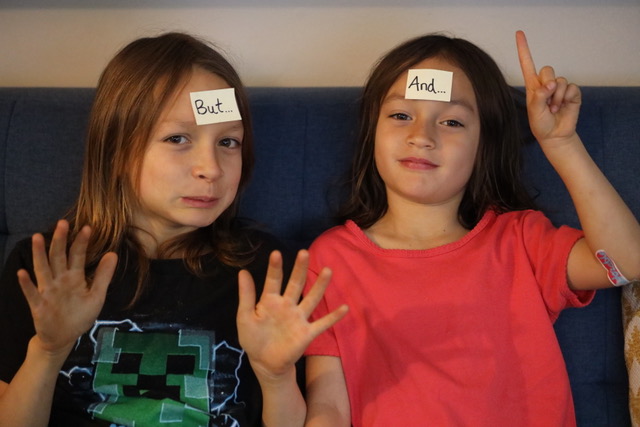


I’m a but-head.
You’re probably a but-head.
I don’t mean to be and I’m sure you don’t either. It just happens, despite our best intentions.
I’m talking about the overuse of the word “but” in conversation. The word “but” keeps us from sustaining the rapport we work so hard to build with others. To test this out, I tried an experiment with my son over breakfast:
“Aidan, check this out. I’m going to give you two statements. You tell me which one feels better:
‘Aidan, I’m so so proud of you for working so hard on your last book report for the year!! I really appreciate how much you focused on it! But, next time let’s spend some time together so we can correct all the spelling mistakes.’
OR,
‘Aidan I’m so so proud of you for working so hard on your last book report for the year!! I really appreciate how much you focused on it! And, how ‘bout next time we spend some time together so we can correct the few spelling mistakes before you turn it in.’”
A big smile spread across his face. “Oh yeah. Wow. That second one made me feel so much better. Yeah, that’s awesome.”
As I spoke the first statement Aidan’s shoulders tensed up slightly as I launched the, “But, next time…” And, they stayed tense until I said the second example. As he heard, “And, how ‘bout next time…” it was as if his body breathed a sigh of relief and he connected with me with a smile.
There are no “buts” about it! “But” is like an eraser. Any work you do to build rapport in a conversation is completely erased by the words that follow a well-intended “but.” The moment we say “but,” we put people on the defense and invalidate what they just contributed or what we just positively acknowledged. Sure, there may be a time and place to insert your very justified “but.” If your intention is to deliberately state the contrary, don’t think twice about using it.
However, if you want to build rapport and keep people open, try replacing the word “but” with “and.” If “and” doesn’t fit well, a bit of silence before you transition to the next thought will serve you well. A slight pause in place of “but” reinforces rapport by signaling that their contributions are valid and valued.
Notice how these pivots feel. Mindfully removing “but” primes you for a more inclusive response:
“I like that idea, but I doubt it’s going to work.”
OR
“I like that idea, how might that work?”
“I appreciate how much you’ve contributed to this project, but we’ve decided to go another direction.”
OR
“I appreciate how much you’ve contributed to this project, thank you. (insert a few second pause) We’ve decided to go another direction.”
“Honey, I’ll always love you unconditionally, but I hate that you can be so mean to your sister.”
OR
“Honey, I’ll always love you unconditionally. And because I do, I’m here to help you grow. Your words and your actions have an impact on your sister, can you please put yourself in her shoes and ask yourself what it would feel like to be talked to that way?”
“I get that this situation has been really hard for you, but if you just read that book I gave you, you’d probably feel a lot better.”
OR
“I get that this situation has been really hard for you. (a few seconds pauses) Have you found any relief in that book I gave you?”
These messages with “but” (and countless others not exemplified here) are clear: “I value, acknowledge, validate your existence, experience and/or contribution. But, what I have to say overrides your point of view and I want you to know it. And, if you just saw it my way, we’d all be in a better place.”
Ok, that may be a bit dramatic, but that’s the crux of the matter. (I intentionally just did it there if you caught that 😉
Stop and think about why we might feel compelled to use “but.” We like to be right. Neuroscience tells us we can even become addicted to being right (Gotta love that dopamine hit!) Our desire to be right can interfere with our virtuous aspirations of innovating, connecting, and inspiring others. The way to keep people creative and inspired is to keep them from feeling the need to protect their point of view. The easiest way to do that is to monitor, and judiciously use, that sticky word “but.”
So don’t be a but-head. 🙂
To try this out, heighten your awareness of your use of “but.” Notice how you feel when others use “but” with you. Notice how often you feel compelled to say or type it out. Try to switch it out for “and.” Or, use silence before you move to your point. If you’re like me, you’ll catch it right after you say it and want to suck back in. “Delete! Delete!”
For me it can sound like this: “Thanks so much for cleaning your room Aila, but next… NO! NOT BUT!…. AND… (insert big smile here) next time how about we try getting it done after the first time we ask, not the 13th.”
Judith E. Glaser, Founder of Conversational Intelligence wisely said, “Words create worlds.” I couldn’t agree more. It’s a wonder to observe just how much we can build rapport and or shut others down with simple shifts in our word choice. What kind of world are you creating for yourself and others with the words you choose?
If you like this article post BUT feel compelled to argue any of it’s points, I gladly welcome your feedback.
If you like this article AND are thinking of a friend that could use it, pass it on!
If you want to build rapport with others, increase your Conversational Intelligence by working with me.